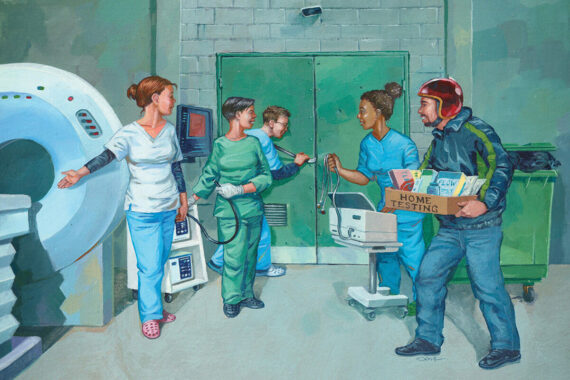In May, Pulse explored the trend of unofficial health screening offered by charities and private companies. Often funded by pharmaceutical firms or fronted by celebrities, these campaigns have lasting effects on general practice.
From kits promising to tell women if they’re perimenopausal to private PSA tests checking men for prostate cancer, there is no shortage of screens available to willing consumers.
Some arguably have a more compelling rationale, PSA testing being a case in point.
NHS screening for prostate cancer was rejected by the independent UK National Screening Committee (NSC) back in the 1990s, but charity Prostate Cancer UK and researchers from the University of Cambridge both argue that this should be reconsidered.
The NSC is due to review evidence and its stance in the next year or so, and could concede screening for certain at-risk groups.
Another charity-led scheme, this time from Cardiac Risk in the Young (CRY), has seen ECG tests offered to all between the ages of 14 and 35, with the charity saying it performs up to 30,000 tests each year.
But the NSC doesn’t recommend this screening for good reason. It risks identifying people as positive in the absence of any underlying condition that could cause sudden cardiac death, and there are no researched interventions that could prevent it.
A more pressing concern for general practice is the additional workload these screening campaigns generate.
Many, like CRY’s subsidised ECGs, send anyone with abnormal findings to their GP for advice, further investigations, and even to interpret the results of tests they didn’t ask for.
One GP told Pulse of a phone call from the distressed parent of a child screened at school by CRY, who recommended the child be referred for NHS echocardiogram and 24-hour ECG, all unnecessarily as it turned out.
The burden on GPs to either reassure panicked patients or to organise additional batteries of tests often comes at great cost, stealing time and resources from patients who have genuine need.
It’s not just unofficial screening that’s creating swathes of worried well patients. A rise in the numbers of self-testing kits consumers can use in the comfort of their own homes prompted calls for the MHRA to regulate such kits and for NICE to produce guidance to safeguard patients.
Retail giant Tesco is guilty of peddling the practice of self-diagnosis, announcing earlier in the year it would begin selling self-testing kits for thyroid and ferritin levels, menopause and male infertility, and microalbuminuria – an indicator of chronic kidney disease – among others.
This could see the average shopper scanning a bowel cancer screening test at the supermarket checkout alongside a loaf of bread and a pint of milk.
Companies such as Bupa and Bluecrest Health add to the mix by offering private health checks, some at a significantly discounted price to boost take-up. Even without private insurance, these checks and tests are available with a price tag of up to £900 for the top package.
Notwithstanding the pressure all these back-door tests heap on to general practice and the wider NHS, they risk producing false positives, leading to investigations that are not needed, and exacerbating overdiagnosis and overmedicalisation.
The result is swarms of patients riddled with health anxieties, with no shortage of companies in their slipstream ready to profit.


















ECG screening at school is the responsibility of the School Health Service to monitor, review, investigate, and refer, not the GP.
GPs might wish to remind local schools, especially private schools, of the rates the GP charges for services as school’s Medical Officer.
Absolutely agree with the whole article and the last paragraph is spot on !
Patients are far too stupid and ignorant to make decisions for themselves and need to be told what to do by their intellectual superiors.
Unofficial screening is only a problem because the free-at-the-point-of-abuse idiocy protects users from the financial consequences of their actions and dumps the costs on everyone else.
The NHS provides breast cancer screening, despite the continued uncertainty as to whether the benefits outweigh harms; a recent JAMA paper found no evidence that screening populations increased life expectancy.
Bowel cancer screening was eventually introduced many years after robust evidence of benefit, a delay that will have certainly cost lives; the narrow age range and prolonged interval between testing means cases of bowel cancer will continue to be diagnosed late.
People make apparently irrational decisions; but sadly the NHS cannot be trusted either.
According to the CRY website the ecg is reviewed by a cardiologist. The website implies that they (ie CRY) arrange both ecg interpretation and an echo if there is a family history. I can’t see any mention of GP needing to do anything?